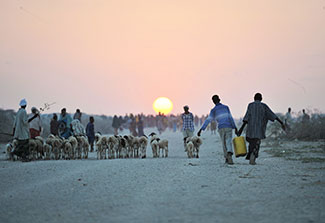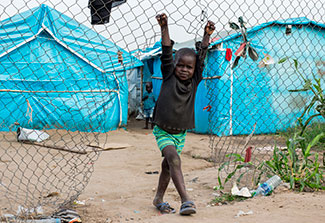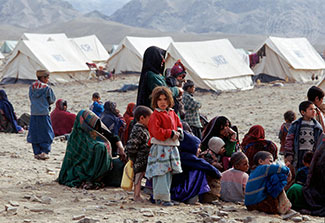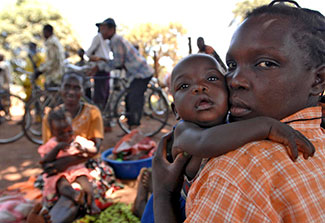Scientists describe challenges and lessons learned when conducting research in humanitarian crises
January / February 2021 | Volume 20 Number 1

UN Photo/Tobin Jones
Fogarty and its partners are working to catalyze timely, high-
quality health research in humanitarian crises and encourage
evidence-based decision making in response efforts.
Hundreds of millions of people around the world are affected by humanitarian crises such as armed conflict, forced displacement, natural disasters and major disease outbreaks. Globally, one in six children lives in or near a conflict zone and nearly 80 million people have been forcibly displaced from their homes, according to the U.N. The frequency, intensity and complexity of these crises has steadily increased over the past several decades. Just in the past few years - as parts of the world faced hurricanes, wildfires and floods - armed conflicts continued unabated and millions of refugees remain unable to return home. On top of all of this, the world is now dealing with the deadly COVID-19 pandemic.
These crises take a staggering toll on human health, directly and indirectly, and especially in low-resource settings. Yet there is a dearth of high-quality, reliable evidence to inform the governments, non-governmental organizations (NGOs) and humanitarian groups responding to them. To bring together the diverse actors in this field, Fogarty launched an effort in 2018 called
Advancing Health Research in Humanitarian Crises, managed by its Center for Global Health Studies. A meeting was convened and a steering committee was formed, representing academic institutions, humanitarian NGOs and several other NIH institutes. The overarching goals are to catalyze timely, high-quality, ethical and actionable research in humanitarian crises; and encourage uptake of evidence into the policy and practice of organizations that respond to these crises.
The partners agreed there are examples of high-quality, ethical and actionable studies and there is much that can be learned from this small but growing body of humanitarian health research. A call for proposals describing such examples was issued and a number were selected to be developed into case studies, which are being published as
Lessons from the field: Confronting the challenges of health research in humanitarian crises, an open-access collection by the journals
Conflict and Health and
BMC Public Health. The projects cover several different types of humanitarian crises across diverse geographic locations, populations, diseases and health risk factors, including maternal and child health, nutrition, mental health, infectious diseases and gender-based violence.
Unlike traditional research papers, the case analyses in the collection go beyond what research was conducted and explain why the research was important and how it was conducted in these extremely challenging settings, the authors noted. The papers emphasize the importance of health research in the humanitarian context, provide critical analyses of the unique challenges for scientific work in these settings and share the strategies used to address them. The authors also identify scientific areas of high public health significance that can best be addressed through research in humanitarian settings.
Each case analysis follows a standardized format enabling both researchers and humanitarian actors to review lessons learned from research conducted in the field. Ultimately, the collection makes the case for why humanitarian research is integral to progress in global health and deserves greater attention from the global health research community.
The studies summarized here took place prior to the COVID-19 pandemic. Nevertheless, the experiences described are relevant as the humanitarian crises currently facing the world become more common, complex and interrelated. Additional case studies are being reviewed and a complete collection is expected to be published in spring 2021.
Conducting research in a war zone

UN Photo/JC McIlwaine
This collection of case studies illustrates the unique
challenges involved in conducting research in humanitarian
crises and strategies used to address them.
In South Sudan, the 2016 civil war led to mass displacement that severely limited access to health care, with pregnant women and newborns among the most vulnerable. Translation of newborn guidelines into public health practice, particularly during periods of ongoing violence, are not well studied during humanitarian emergencies.
A research team assessed the delivery of newborn interventions in displaced person camps to understand implementation outcomes. Attacks against humanitarian aid workers required research partners to modify study plans on an ongoing basis to ensure staff and patient safety. South Sudan faced devastating cholera and measles outbreaks that shifted programmatic priorities. Costs associated with personnel travel and equipment transport kept rising due to hyperinflation. A number of strategies used to address these challenges are applicable to other humanitarian settings. These include: collaborating with non-research partners to identify operational solutions; maintaining a locally-based study team; being flexible with budgets and timelines; using mobile data collection to conduct timely data entry and remote quality checks; and deploying a cascade approach for training field staff.
Engagement of national and local stakeholders can ensure health services and data collection continue and findings translate to public health action, even in contexts facing severe and unpredictable insecurity, the researchers suggested.
Providing palliative care to refugees
Another research team studied how ethically and contextually appropriate palliative care might be provided during humanitarian crises by examining refugee settings in Jordan and Rwanda. An unintended outcome of the research was lessons learned about the ethical dimensions of transnational research partnerships. Common experiences across study settings revealed the importance of building relations that are sensitive to multiple vulnerabilities and unequal power among both research partners and research participants. Also imperative is the need to create spaces that facilitate sharing of knowledge and experiences.
The authors said their analysis sheds light on the importance of understanding cultural norms in all research roles, building relationships with decision makers, and developing teams that include investigators from within humanitarian crisis settings to ensure that mutually beneficial study outcomes are ethical, as well as culturally and contextually relevant.
Studying sexual and reproductive health
Since 2017, Rohingya people have been sheltering in the refugee camps of Cox’s Bazar, Bangladesh due to armed conflict in the Rakhine state of Myanmar. With half the population made up of adolescent girls and women, sexual and reproductive health (SRH) services are vital. A research team examined the population’s SRH needs and barriers to care by conducting a cross-sectional survey, in-depth interviews and group discussions. They also assessed health facility readiness and supply-side difficulties.
The investigators encountered three key challenges including sensitivity regarding the study topic, identification of appropriate sampling strategies and community trust issues. To overcome them, researchers actively engaged community members and gatekeepers to access respondents, identified sensitive issues through the survey and interviews, and contextually modified the sampling strategy. Another key insight reported was that including researchers from the host country may create distrust among refugee populations, which could make them reluctant to cooperate with the research team.
Natural disasters exacerbate challenges
There are a number of lessons learned from obstacles faced while undertaking field studies after natural disasters such as earthquakes and tsunamis, one research team reported. Particular issues of post-disaster settings include challenges with uncharted ethical and cultural considerations; and non-standardized methods of record keeping, data sharing and dissemination. Relying on local partners and making quick decisions to tackle issues is imperative for navigating both foreseen and unforeseen complications, they said.
While pre-emptive action to address these concerns is the most efficient means to expedite research protocols, adaptability and contingency planning are key components of practical research implementation in dynamic situations. Research is not always a priority in humanitarian settings, so innovative methods are necessary to conduct meaningful and situationally appropriate research in these venues. The team suggested that hurdles to conducting research can be overcome by understanding available resources, local culture, and political considerations; and working efficiently and decisively.
Examining the lived experience of hurricanes
Two devastating hurricanes in 2017 destroyed much of Puerto Rico’s residential and environmental infrastructure, displacing thousands of people and resulting in an unprecedented migration to the mainland U.S. Researchers studied the impact on survivors, both in Puerto Rico and in central Florida, a major resettlement hub.
The scientists faced challenges such as the emotional distress of participants and team members, difficulty accessing affected populations and precarious environmental factors. One tool used was the Critical Medical Ecological model, which considers how a number of sociocultural, biologic, health care and natural factors impact communities, households and individuals. The researchers also collected cathartic narrative accounts of the lived experience of hurricane survivors. All participants received a pamphlet that included the contact information for mental health services.
The researchers said the project demonstrates the value of pre-existing partnerships, critical consciousness in the field team and medical ecological modeling as an organizing tool to help understand the community and individual impact of environmental disasters.
Studying mental health in tsunami aftermath
The Indian Ocean tsunami in 2004 caused a major loss of life and subsequent emotional trauma for survivors. Psychosocial needs in the aftermath of this disaster were extensive, yet the cohesion and effectiveness of the response were limited due to lack of preparedness and relevant policies.
One organization that responded to the crisis saw the need to study the difficulties, successes and limitations of psychosocial interventions. Since temples, mosques and churches were places that people accessed to find healing and peace, the team reported that adding mental health resources in those settings reduced stigma surrounding care and increased available services. Capacity was also bolstered by training community level workers on psychosocial intervention methods, which also provides long-term resources. Care offered to survivors included one-on-one interactions, medications from nearby hospitals and group activities. These sessions ranged from dance and music programs to role-plays, which worked well with children in particular. Video consultations with psychiatrists were also offered.
Research results have informed state and national disaster response plans.

UN Photo/Luke Powell
Conducting research in conflict zones poses unique challenges.
Conducting research amid armed conflict
The provision of health and nutrition interventions for women and children in conflict zones was the topic of study for research teams in Afghanistan, Mali, Pakistan and Somalia. Security was a fundamental obstacle in all study contexts, with restricted geographical access and concerns for personal safety affecting sampling and data collection plans, and requiring reliance on digital communications, remote study management and off-site team meetings wherever possible.
The researchers drew several conclusions from their work. Strong local partners are essential to the success of any project, contributing not only technical and methodological capacity but also the insight needed to truly understand and interpret local dynamics. Maintaining realistic expectations of data that are typically available in conflict settings is also essential, while pushing for more resources and further methodological innovation to improve data collection. Finally, successful health research in the complex, dynamic and unpredictable contexts of conflict settings requires flexibility and adaptability of researchers, as well as sponsors and donors.
Building trust in times of unrest
Ethiopia has high numbers of people displaced by conflict, which makes both routine and humanitarian research very difficult. A team studying childhood nutrition discovered communities were suspicious of outsiders. Some reactions were so hostile that researchers were fearful about returning to some households. As a result, the team designed strategies to respond, including establishing community advisory boards using village elders and local youth. Data collection team members received training in principles of ethics, consent and crisis management, and were provided on-going support.
As the researchers built trust with the community, they were regularly asked to provide relief and aid, which resulted in ethical dilemmas. Sometimes severely malnourished children were identified during data collection. The research team decided to provide medical assistance where appropriate, and transportation to and from nearby health facilities where necessary. While this can provide misconceptions if the communities believe they must participate in order to receive the other benefits, researchers decided that the children’s health outweighed these concerns. Lessons learned from these studies are already being used to inform other research projects.

UN Photo/Tim McKulka
Conducting research in unstable settings is challenging but
vital to ensure refugee health interventions are evidence-
based.
Studying the health of Ebola survivors
In late 2015, the Sierra Leone government established a program to improve the well-being of the country’s 3,466 registered Ebola virus disease survivors. A mixed-methods study sought to determine survivors’ access to health services offered, their health and disability status, and psychosocial and mental health issues faced. Qualitative data from survivors and stakeholders at multiple levels complemented and contextualized the survey results to shed light on the unique health and associated socioeconomic complexities that survivors face, which could be applied to other crisis settings.
The study faced several challenges, including working in a low-resource setting marked by constantly changing priorities and activities of donors and implementers. The research aimed to measure sensitive topics, such as mental health and disability, with standardized tools that required careful contextualization for accurate reporting of findings. Flexibility is paramount when conducting high-quality research for representative and useful results, the authors noted. Timely research and ongoing sharing of the findings with stakeholders is critical to ensure that they benefit study subjects.
Determining the long-term impact of war
Globally, one in four children lives in a country affected by armed conflict or disaster, often accompanied by exposure to a range of adversities including violent trauma and loss. A study in Sierra Leone is examining the long-term effects of children’s experiences in the country’s eleven-year (1991–2002) civil war on their adult mental health and functioning, in addition to exploring the potential mechanisms by which intergenerational transmission of emotional and behavioral disruptions due to war trauma may operate. The research project utilizes mixed methodologies that incorporate qualitative and quantitative data to unpack risk and protective factors involved in social reintegration, psychosocial adjustment, parenting and interpersonal relationships.
There are unique ethical issues posed by this type of research, the authors acknowledge, making it important to recognize the power differential that exists between scientists and vulnerable populations. Also, there is the potential for risk of suicide, physical or sexual abuse, or other harm. Researchers should anticipate and plan how to respond to these risks before their studies begin, the authors suggested. Flexibility, strong communications channels and robust partnerships are also vital to the process.
Lessons learned from research in South Sudan
Scientists evaluating health interventions among South Sudanese refugees sheltering in Ethiopia confronted a number of barriers. They faced ongoing local political and tribal conflicts, extreme weather conditions, difficulty implementing a new digital data monitoring system, the need for staff capacity building and low-literacy research subjects. Investigators noted the need for flexibility to ensure staff and participant safety, and outreach activities to find subjects who may have relocated due to safety concerns.
To overcome the lack of data expertise and slow internet, data uploads were conducted at night or at partner organizations with stronger internet connections. Remote training sessions were conducted and weekly calls held to monitor progress and troubleshoot any issues. Local staff provided input to help ensure study measures and interview questions were understandable among participants, with pictorial representations developed for low-literacy respondents.
Measuring profound stress among youth
One research team measured the effectiveness of a structured psychosocial intervention designed to alleviate stress and build resilience among Syrian refugees and Jordanian host-community youth. The scientists overcame significant obstacles to implement the study. It was difficult to establish a fair and transparent randomization process for research subjects and challenging to collect biological samples and test cognitive skills in difficult field conditions.
Also, the team had to reconcile different demands and timeframes for dissemination of results in peer-reviewed academic journals vs. influential policy reports. They discovered it was important to develop a strong sense of local ownership through engagement with communities, and to rely on local partners to recruit and track participants. Researchers discovered young people were keen to participate in the study, viewing it as cutting-edge science and a means to tell their stories. They also appreciated toiletries offered as compensation for their time, in addition to professional hair styling as part of the sample collection to measure stress by testing cortisol levels.
More Information
To view Adobe PDF files,
download current, free accessible plug-ins from Adobe's website.